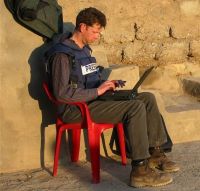News
Obituary - Seb Alison, talented correspondent with a nose for the most colourful stories
Thursday 3 October 2024

Sebastian Alison, who died on September 20 at the age of 63, came to regard his Reuters postings to Russia and then Kazakhstan in the mid-1990s as the pinnacle of his journalistic career.
Though he was subsequently posted to Brussels, and did stints in Iraq and Afghanistan, it was the work he did - and the friends he made in Moscow and Almaty - that meant the most to him.
A gifted linguist and a writer with an eye for a colourful story, Seb arrived in Moscow in 1998 at a particularly chaotic period of Russian history after the Soviet Union’s collapse. He thrived on it. In many ways, he was the opposite of the mayhem around him -- calm and assured, and invariably able to make sense of it all.
“It was the highest point of my career,” he said in London this summer as he reflected on his life, weeks before succumbing to cancer.
Seb, who read Russian at Durham University and went to Marlborough House prep school and Eton College, found he could turn his hand to just about any story that came his way. A knowledgeable and well-sourced reporter on oil and other commodities, having previously worked for Petroleum Argus, he was also adept at recounting the latest twists and turns in the battle for control of Russia’s vast natural resources.
“Seb was hugely talented and we were lucky to have had him in Moscow and Almaty,” former Moscow bureau chief Martin Nesirky recalled.
Seb was most proud of the features he wrote for Reuters. The more bizarre the story, the more it seemed to catch his imagination. His mouth would turn up in a wry grin and his eyes would twinkle as he embarked on his latest story, hoping to reveal a particular injustice or capture the absurdity of life in post-Soviet Russia.
“At a heady time in the 1990s when Moscow was filled with foreign correspondents eagerly exploring the world beyond the old iron curtain, no one was more enthusiastic than Seb, who would regularly disappear for a few days to the dreariest of provincial cities, and return with features brimming full of anecdotes and must-see attractions in the unlikeliest places,” said Peter Graff, a former colleague in the Reuters Moscow office. “If you didn’t know Seb, it might be hard to believe anyone could have quite that much fun in Samara or Tula. But if you saw his face, you knew his excitement was genuine.”
Friends in the Moscow office remember fondly the happy hours spent playing pool with Seb, putting the world to rights over a beer and sharing a laugh.
“Seb always had a knack or the nose to find the most out of the way and most fun places to hang out after a hard day’s work. As he always said, we worked very, very hard but we also knew how to party,” said Liz Piper, another correspondent in the Reuters Moscow office in the 1990s.
Seb was rewarded for his work in Moscow by being appointed in 2000 to lead the Reuters bureau in Almaty, from where he covered Central Asia, enabling him at times to travel to places that today are largely out of bounds for Western journalists. For Seb, it was a great adventure, taking nim to exotic destinations such as Nukus in Uzbekistan’s Karakalpakstan region, where he shed light on the damage Uzbek agricultural policy was doing to the environment and public health. It was the kind of story Seb loved writing and reporting, and the kind he wanted to be remembered for.
After leaving Reuters in 2006, he joined Bloomberg, for whom he also worked in Moscow, and rejoined Petroleum Argus. By the time of his death, he was back in London, with his family and former wife Sasha often at his side as his health worsened. His sister Rosie and his daughters Natasha and Sophia, of whom he was immensely proud, were with him at his deathbed in St Joseph’s Hospice in London.
(Photo shows Seb Alison in Northern Iraq) ■
- « Previous
- Next »
- 25 of 2177